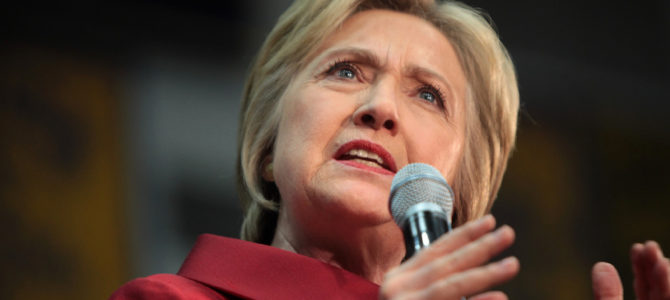
Hillary Clinton wants to abolish the Electoral College as “an anachronism that was designed for another time that no longer works.”
She won the popular vote and lost the presidency to Donald Trump, so you can’t really blame a girl for trying, but to be fair, she said the same thing back in 2000: “I believe strongly that in a democracy, we should respect the will of the people and to me, that means it’s time to do away with the Electoral College and move to the popular election of our president.”
So, to be perfectly fair, Hillary Clinton has never understood the Electoral College.
Trust History: We Don’t Want Mob Rule
First of all, we’re not a democracy, which you would think a U.S. senator turned secretary of state turned presidential candidate would know. We’re better than a democracy. We’re a republic with democratically elected representatives: “We pledge allegiance to the flag and to the republic for which it stands…” You can call us a democratic republic or a representative democracy. Just don’t call us a democracy (or late for dinner).
We’re better than a democracy because democracy is just a fancy word for mob rule. Mob rule is what Plato meant when he wrote about the “tyranny of the majority,” where the mob doesn’t care what anyone else wants. And why should they? We all vote our self-interest.
The problem is that the tyranny of the majority drowns out every last bit of the minority’s self-interest. Our framers, who knew their Plato, devised the Electoral College to prevent such tyranny from happening here. It works beautifully. Here’s how.
Different People Have Different Priorities
Clinton won the popular vote because a lot of the same kinds of people in the same kinds of large, urban places, like California, New York, Massachusetts, and Illinois, dominated the presidential election. Coal miners in West Virginia, the ones she bragged about putting out of work, weren’t as numerous but wanted their voice heard on the matter, thank you very much.
And why shouldn’t they? Why should elites in San Francisco and Chicago, who can afford energy at any expense, decide for everyone else that less expensive energy derived from coal is forbidden? Easy for them to say.
Liberal elites freak out about a degree or two of climate change, but they can afford to spend a gazillion more dollars in the (so far futile) attempt to reduce that one or two degrees by a third or a half. Well, coal miners have a vested interest in asking, “Are we sure the cure isn’t worse than the disease?” Right or wrong, thanks to the Electoral College, they get a voice in the debate.
West Virginia (like everyone else) gets an electoral vote for each senator and a vote for each congressional representative to the House. In the 2016 election, West Virginia was granted five electoral votes. It doesn’t sound like a lot compared to New York’s 29 or California’s 55, but it’s enough to keep the state in play when added to a handful of votes from other small states. In 2004’s presidential election, George W. Bush defeated John Kerry by 35 votes. In 2000, Bush defeated Al Gore by a measly five.
It’s Like the World Series
The Electoral College separates out each state’s self-interest for consideration but doesn’t guarantee that a particular state counts in a particular election. Lucky “battleground” states like Ohio (18 votes) usually get a lot of campaign play. Unlucky states like Wyoming and South Dakota (three votes each) usually don’t. But the Electoral College guarantees that even states with a small number of electoral votes could get a lot of campaign play someday depending on the political climate and each candidate’s path to victory. It keeps everyone in the game.
Think of it like the World Series. It doesn’t matter how many runs are scored in one game, like it doesn’t matter how many votes are received by a candidate in one state. The only thing that matters is which team won that game, or which candidate won the electoral votes of that state. The next game is played, the win is recorded, and so on until one team reaches four wins and is declared the series champion. Likewise, the next state’s electoral votes are cast, and so on until one candidate reaches 270 electoral votes and is declared the commander in chief.
Clinton doesn’t understand any of this, or doesn’t want to understand it because the math is not in her favor. Even more striking is her faulty reasoning about the outcome in 2016 if she’d had her wish and there had been no Electoral College—she thinks the bells would be pealing for Madam President even as we speak.
But there’s no guarantee they would be. Had the Electoral College not been a factor, Trump would have campaigned entirely differently. How does anyone know he couldn’t have won the popular vote if he had charted a different path to victory and visited different states a different number of times in a different order? We’ll never know. What we do know for sure is that coal miners wouldn’t have had a voice.







